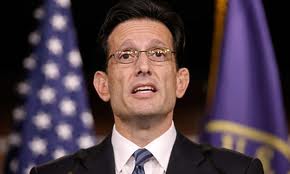Congressional insiders say that House Majority Leader Eric Cantor is refusing to hold an "all or nothing" vote on President Obama's jobs bill. Cantor says he'll bring "elements" of the bill to the floor but not the whole bill.

It's pretty clear which elements Cantor approves of. He expressed his preferences soon after the president unveiled his $447 billion job-creation proposal, which includes $50 billion for infrastructure investment -- something Obama's been pushing for (though not always pushing very hard) since Labor Day of last year.
“Over half, I think, of the total dollar amount is so-called stimulus spending," Cantor told reporter Brian Beutler soon after Obama announced his jobs plan. "We’ve been there, done that. The country cannot afford more spending like the stimulus bill.”
The Washington Monthly's Steve Benen responded:
A little more than half of the American Jobs Act is made up of tax cuts. Cantor, at least today, didn’t reflexively rule out these provisions.
Instead, what Cantor disapproves of are the parts of the proposal most likely to create jobs — infrastructure investments, job training, unemployment aid, and assistance to states to prevent public-sector layoffs. It’s as if the oft-confused Majority Leader looked at the plan, found the measures that would have the great[est] impact to improve the economy, and immediately rejected them.
A Republican version of the jobs bill would almost certainly eliminate the infrastructure bank, which Obama proposed as part of the jobs bill. House Transportation Committee Chair John Mica immediately repudiated this idea, saying, "Unfortunately, a National Infrastructure Bank run by Washington bureaucrats requiring Washington approval and Washington red tape is moving in the wrong direction." He preferred his own plan of encouraging states to set up their own banks.
Given their anti-stimulus rhetoric, Republicans would also likely strip out the $50 billion for transportation infrastructure.
The president has signaled his growing impatience with the slow pace of Congress to take up the jobs bill. More than three weeks after he announced it, the bill has yet to be introduced in either chamber.
“We still have to have congressional action,” Obama said today at the start of a Cabinet meeting. “It’s been several weeks now since I sent up the American Jobs Act and, as I’ve been saying on the road, I want it back. I’m ready to sign it.”
Obama says he expects the jobs bill to be ratified by both houses and on his desk by the end of the month.
President Obama invited Republicans to negotiate, "If there are aspects of the bill that they don't like they should tell us what it is they are not willing to go for," he said. "They should tell us what it is they are prepared to see move forward."
He sounded a similar note in his radio address this weekend, saying Republicans should be clear exactly what in the bill they'd go along with, and what in the bill they oppose. "And if they're opposed to this jobs bill, I'd like to know what exactly they're against," Obama said. "Are they against putting teachers and police officers and firefighters back on the job? Are they against hiring construction workers to rebuild our roads and bridges and schools?"
But it's not just Republicans who are preventing the bill from being voted on. Democrats say they don’t yet have the votes to pass the jobs bill, even in the Senate, where they have a majority. Majority Leader Cantor taunted the president about that, saying, "the president has some whipping to do on his own side of the aisle."





